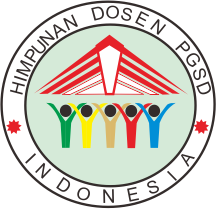MENGEMBANGKAN PEMBELAJARAN IPS DALAM PERSPEKTIF PARADIGMA KONSTRUKTIVISTIK (Upaya Implementatif Kebijakan Kurikulum 2013 pada Sekolah Dasar)
DOI:
https://doi.org/10.30595/dinamika.v6i2.908Keywords:
Social Education learning, constructivistic paradigmAbstract
Based on the research results, Elementary School Teachers still emphasized on cognitive and psychomotor domain in social education learning. Therefore, the learning achievement of Social Education was still meaningless in students’ real life. In Law No. 20/2003 explained that the aims of national education were: to make students creative, autonomous, democratic, and responsible. To develop social education material became more meaningful, teachers needed to implement constructivistic paradigmReferences
Affandi, Idrus. (2011). Pendidikan Politik Mengefektifkan Organisasi Pemuda Melaksanakan Pancasila dan UUD 1945. Bandung: UPI.
Budimansyah, Dasim. (2008). Pembelajaran Pembudayaan Nilai Pancasila. Bandung: PT. Genesindo.
Depdiknas. (2001). Kurikulum Berbasis Kompetensi Mata Pelajaran Ilmu Sosial Sekolah Dasar, Jakarta : Puskur Balitbang
Endarswara, Suwardi. (2010). Etika Hidup Orang Jawa Pedoman Beretika dalam Menjalani Kehidupan Sehari-Hari. Yogyakarta: Narasi.
Glasersfeld, E. (1989). Cognition, Construction of Knowledge, and Teaching. Washington D.C: Falmer Press.
Hadi, N. (1997). Pemanfaatan Sumber Belajar Oleh Guru dan Pengaruhnya terhadap Hasil Belajar dalam Pengajaran Pendidikan IPS (Studi Kasus di Kelas III SDN Kauman I dan SDN Kotamadia Malang-Jawa Timur. Bandung: Tesis S2 PS PIPS Sekolah Pascasarjana UPI.
Hasan, Hamid S. (2000) Multikulturalisme Untuk Penyempurnaan Kurikulum Nasional, Jurnal Pendidkan dan Kebudayaaan.
Jarolimek, J. and Parker, W. (1993). Social Studies in elementary Education, 9th Edition. New York: Macmillan Publishing Company.
Joyce, Bruce., Marsha Weil, Emily Calhoun. (2009). Models of Teaching. (Terjemahan Achmad F dan Ateilla M.), Yogyakarta: Pustaka Pelajar.
Kurikulum 2013. http://www.scribd.com/doc/120652530/Kurikulum-2013
Lorsbach, A. & K.Tobin, (1992). “Conctructivism as a Referent for Science Teaching”. NARST Research Matters- to the Science Teacher, No. 30.
Maryani, Enok. (2011). Pengembangan Program Pembelajaran IPS Untuk Peningkatan Keterampilan Sosial. Bandung: Alfabeta.
Maxim, George W. (2010). Dynamic Social Studies for Constructivist Classrooms. United States of America: Linda Cox.
NCSS. (2000). National Standards for Social Studies Teachers: National Standards for Social Studies Teaching, Vol. 1. Washington, DC: NCSS.
Sanjaya, Wina. (2011). Perencanaan dan Desain Sistem Pembelajaran. Jakarta: Kencana.
Schuncke, G.M. (1988). Elementary Social Studies : Knowing, Doing, Caring. New York: Macmillan Publishing Co Ltd.
Somantri, Muhammad Numan. (2001). Menggagas Pembaharuan Pendidikan IPS, Bandung: Remaja Rosdakarya.
Sukadi. (2012). Sosok Ideal Pendidik Untuk Menyiapkan Manusia Indonesia Berkarakter Unggul Generasi 2045. Konapsi 7 konvensi nasional Indonesia VII di Universitas Negeri Yogyakarta.
Suyanto dan Asep Djihad. (2012). Bagaimana Menjadi Calon Guru dan Guru Profesional. Yogyakarta: Multi Presindo.
Wiriaatmadja, Rochiati. (2002). Pendidikan Sejarah Di Indonesia, Perspektif Lokal, Nasional, dan Global. Bandung: Historia Utama Press FPIPS UPI.
Downloads
How to Cite
Issue
Section
License
Authors who publish with this journal agree to the following terms:
Authors retain copyright and grant the journal right of first publication with the work simultaneously licensed under a Creative Commons Attribution License that allows others to share the work with an acknowledgement of the work's authorship and initial publication in this journal.
Authors are able to enter into separate, additional contractual arrangements for the non-exclusive distribution of the journal's published version of the work (e.g., post it to an institutional repository or publish it in a book), with an acknowledgement of its initial publication in this journal.
Authors are permitted and encouraged to post their work online (e.g., in institutional repositories or on their website) prior to and during the submission process, as it can lead to productive exchanges, as well as earlier and greater citation of published work (See The Effect of Open Access).

Dinamika Jurnal Ilmiah Pendidikan Dasar is licensed under a Creative Commons Attribution 4.0 International License.













